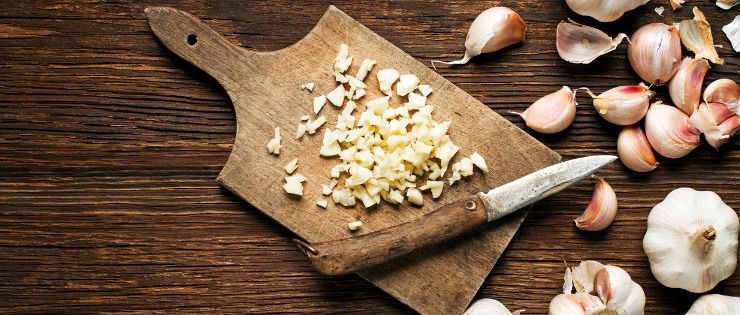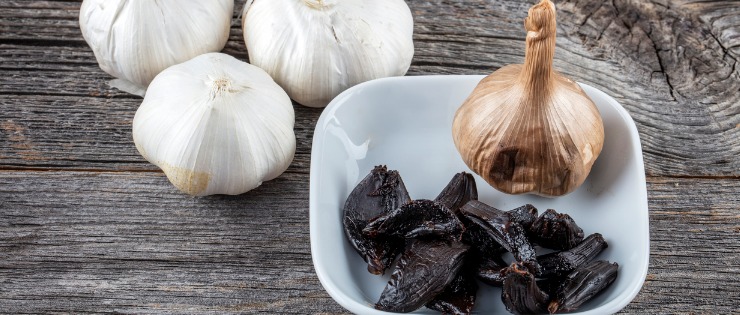
For thousands of years garlic has been used for food and medicine. People have claimed garlic can ward off vampires, cure the Bubonic plague and, more recently, prevent the common cold. But do these health claims have a modern medical basis? Here's the facts and myths about the health benefits of garlic.
What is Garlic?
Garlic is part of the Allium family which also includes onions, shallots, leeks, and chives.
Incredibly, there are 600 varieties of garlic in the world, categorised into two main subspecies – hardnecks and softnecks. The most well-known form of garlic is the bulb with nine to twelve cloves which is often chopped or crushed for eating raw or in cooking.
Garlic powder is also used for convenience in many recipes, with many health food shops stocking supplements like garlic extract, garlic oil and aged garlic. Black garlic has also proven to be a popular recipe with many Australian opting to slow cook bulbs in an oven until the cloves are black and treacly.

For most people, garlic is a delicious addition to savoury dishes, sauces and dressings, not a health food.
History
The name garlic comes from the old Anglo Saxon word garleac, meaning ‘spear leek.’ A century ago, French writer and physician Henri Leclerc coined the term ‘stinking rose‘ after roughly translating garlic’s ancient Greek name, scorodon.
The ancient Greeks and Egyptians used garlic for cooking and also believed it had healing properties. India has a long history with garlic, as do many middle eastern and east Asian countries.
Today
Garlic grows easily in mild conditions, so about 2.5 million hectares of land worldwide is dedicated to growing the aromatic bulbs. In the past 40 years, garlic consumption has tripled in the United States.
The Claimed Health Benefits of Garlic
People have made many claims about garlic’s health benefits. Some of these have been thoroughly researched and are backed up by scientific evidence, but many are based on inconclusive studies or outright false claims.
These are the garlic facts we know:
Why is Garlic Beneficial?
Whole garlic contains the amino acid alliin. When chewed or crushed, alliin combines with alliinase to make allicin.
Allicin is the main active ingredient in garlic. It turns into other sulphur-containing compounds which can boost the disease-fighting response in white blood cells when they encounter a virus. Most studies into garlic’s health benefits have focused on allicin.
The amount of allicin in fresh garlic varies depending on the variety of garlic and how it was grown.
Some of the benefits of garlic we found to be credible and based on research include:
Garlic May Help Reduce High Blood Pressure
One of the most recent findings is the effect garlic has on high blood pressure. A review of 11 studies of garlic supplements and blood pressure showed garlic reduced systolic blood pressure by an average of 4.6 mmHg.

The results in people with high blood pressure were even more encouraging with an average reduction in blood pressure of 8.4 mmHg systolic and 7.3 mmHg diastolic. The studies ranged from 12 to 23 weeks in length and didn’t test whether the benefits stop once the daily garlic consumption ceases. Blood pressure medication can have a lasting effect for years.
Using garlic instead of salt to flavour food is also an excellent way for people to manage their high blood pressure.
Garlic Does Have Antibiotic Properties
With the increase in drug-resistant bacteria, scientists are looking for alternatives to develop new antibiotic medications.
Many people try to avoid taking antibiotics because of its harmful effects on good gut bacteria. Natural antibiotic alternatives are also sought for those people who suffer allergic reactions to drugs.
Garlic is considered one of our best natural options because its chemicals have antibacterial, antiviral and antiparasitic properties. To date, studies have shown garlic is an effective treatment against E coli bacteria and drug resistant tuberculosis. While garlic has some antibiotic benefits, it shouldn’t be a substitute for any medications prescribed by a doctor.
Garlic Could Help Prevent Colds
In one study, a group of 146 healthy participants took garlic supplements or a placebo for three months. The group taking garlic had a 63% reduced chance of catching a cold and if they did, their cold had a shorter duration.

However, the validity of research studies into the connection between colds and garlic has come under question. A review titled “Garlic for the common cold (review)” published here found that there is insufficient clinical trial evidence and while a single trial has suggested that garlic may prevent colds, more research is needed.
A Diet High in Allium-Rich Vegetables May Help you Live Longer
Scientists around the world have been studying Blue Zones - regions where a greater percentage of people celebrate their 100thbirthday than in other areas of the world. Their diets include high quantities of plant food, more fish than red meat and reduced sugar. Some researchers have hypothesised that allium vegetables like garlic and onions could play a role in this.
Allium vegetables are a good source of antioxidants and a fat-soluble form of vitamin B1 that our bodies use more readily than water-soluble B1. Garlic also contains compounds that may have an anti-ageing effect by counteracting the glycation process. Glycation ages the tissues through impaired elasticity of blood vessels, skin, and tendons and may increase the risk of type 2 diabetes.
Reduced Risk of Osteoarthritis

A long-term study of 1,000 females twins found that those that ate a diet high in alliums particularly garlic had fewer signs of early osteoarthritis in the hip. The chronic degenerative joint disease affects millions of people around the world. The degeneration of cartilage causes pain, stiffness and loss of movement in joints. Reported in the publication BMC Musculoskeletal Disorders, the study’s authors also believe compounds found in garlic may help treat the condition.
Some scientists also believe a compound called diallyl disulphide, may protect the body from enzymes that damage cartilage. Current osteoarthritis treatments are limited to symptom relief and surgery to replace affected joints.
Garlic Could Help Lower Cholesterol
Researchers studied garlic as a potential way to reduce cholesterol. A trial conducted on rats suffering from hypercholesterolemia caused by a high cholesterol diet showed significantly reduced levels of serum cholesterol, triglycerides, and LDL (bad) cholesterol with no effect on HDL (good) cholesterol levels. Human trials are also encouraging, a 2014 review found garlic preparations significantly decrease serum cholesterol and triglyceride.

In a 2018 study of 51 obese people, half took a daily dose of 3,600 mg of aged garlic extract while the other half took a placebo. After six weeks, those taking the garlic showed reduced LDL cholesterol and modified secretion of inflammatory proteins.
Myths About The Health Benefits of Garlic
Some people make claims about garlic that are potentially dangerous because they don’t have any medical basis. These include claims about using garlic to detoxify the blood and treat acne.
Garlic Should Not be Used to Treat Acne
Some acne sufferers will try almost anything to clear their skin. Allicin in garlic can help kill bacteria so some people claim that garlic is an effective home remedy for acne.
They claim garlic has anti-inflammatory properties so can improve blood circulation and help heal the skin.

We couldn’t find any medical research to support these claims. In fact, putting garlic on your skin could damage it and cause burns.
Garlic Does Not Detoxify Your Blood
Some people claim the sulfur in raw garlic helps the body rid itself of toxins by stimulating the liver to produce detoxification enzymes that filter the blood’s toxins. This article claims two to four cloves each day or taking 600 to 1,200 milligrams of encapsulated or freeze dried aged garlic can help support your body in detoxing naturally.
Unfortunately, anything that claims to detox your body is more than likely not true. Many supplements and diets claim to have a detoxifying effect but this should be a clear warning that their claims are probably not backed by scientific evidence.
Other Folklore and Superstitions About Garlic
For centuries, people around the world believed garlic had magical powers. It was responsible for warding off vampires, evil spirits and deadly disease. The modern world isn’t so concerned about vampires but it is quick to believe garlic has extraordinary healing powers. Some common superstitions about garlic include:

Garlic is not a Mosquito Deterrent
Many people believe that eating garlic can help keep the mozzies away. On the surface it seems to make sense. Mosquitoes are attracted to their human victims by seeking the carbon dioxide we breathe out, our lactic acid and body heat. We emit sulfur compounds from our breath and skin after eating garlic so it would stand to reason that this may be a turnoff for the tiny blood suckers.
However, a research study in 2005 by the University of Connecticut found participants who ate a large quantity of garlic supplements then exposed themselves to mosquitoes were bitten just as often on the days they ate a garlic placebo.
Some people swear by applying a garlic scented lotion on their skin to ward off the disease-carrying insects but this hasn’t been proven as an effective measure either.
Garlic Should Not Be Used on Snake Bites
Some people believe eating crushed garlic after a snake bite will stop internal infection from the venom. However, you shouldn’t put any kind of treatment on a snake bite. The correct first aid procedure for snake bite is to immobilise the limb, apply a tight bandage to the full length of the limb and get to hospital urgently.
It’s Not a Sleep Aid
Putting a clove of garlic under your pillow to sleep better is an old wive’s tale. There’s no evidence that garlic can help you fall asleep or stay asleep. In fact, the aroma of the peeled clove may even inhibit your sleep.
Wearing Garlic Won’t Prevent a Cold
Some people believe wearing a clove of garlic will protect you from the common cold or flu however you need to ingest the garlic to gain any immunity boost or to fight inflammation.
Risks and Side Effects of Garlic
Garlic can have side effects - it’s possible to have too much of a good thing. For some people and in some situations garlic can have dangerous side effects.
Surgery
Garlic can disrupt anti-coagulants, so people taking garlic supplements should discuss it with their surgeon well before any surgery in case they need to stop taking them. Garlic supplements may not be suitable for people taking blood thinning medication. Always tell your doctor about the supplements you take. Even though it’s “natural” it could still interact with other medications.
Garlic Allergy

Some people suffer an allergic reaction after consuming garlic. The most common symptoms include rash, headache and high temperature. While rare, garlic has caused anaphylaxis, a potentially fatal allergic reaction.
Topical Application
Garlic contains a strong chemical agent, diallyl disulphide, which can irritate the skin and even cause a burn or brown mark that takes months to fade. Garlic can also cause an allergic contact dermatitis that looks like scaly red patches or blisters. It is best mixed with other ingredients to reduce the disulphide’s effects or skip the garlic altogether.
Pets
Garlic is part of the onion family. All onion related foods, raw or cooked, shouldn’t be fed to pets because they are poisonous. Onion damages their red blood cells causing them to rupture and can result in anemia. Pet owners should be particularly vigilant about garlic because it’s five times more potent than onion or leeks.
In conclusion, garlic does have some health benefits that stand up to scrutiny, but many other claims are dubious or completely wrong. Always consult your doctor for advice before taking any supplements or changing your diet.